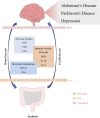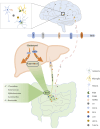Gut microbiota: A new window for the prevention and treatment of neuropsychiatric disease
- PMID: 39989718
- PMCID: PMC11846125
- DOI: 10.1177/11795735251322450
Gut microbiota: A new window for the prevention and treatment of neuropsychiatric disease
Abstract
Under normal physiological conditions, gut microbiota and host mutually coexist. They play key roles in maintaining intestinal barrier integrity, absorption, and metabolism, as well as promoting the development of the central nervous system (CNS) and emotional regulation. The dysregulation of gut microbiota homeostasis has attracted significant research interest, specifically in its impact on neurological and psychiatric disorders. Recent studies have highlighted the important role of the gut- brain axis in conditions including Alzheimer's Disease (AD), Parkinson's Disease (PD), and depression. This review aims to elucidate the regulatory mechanisms by which gut microbiota affect the progression of CNS disorders via the gut-brain axis. Additionally, we discuss the current research landscape, identify gaps, and propose future directions for microbial interventions against these diseases. Finally, we provide a theoretical reference for clinical treatment strategies and drug development for AD, PD, and depression.
Keywords: gut microbiota; gut-brain axis; microbial intervention; neuropsychiatric disease.
© The Author(s) 2025.
Conflict of interest statement
The author(s) declared no potential conflicts of interest with respect to the research, authorship, and/or publication of this article.
Figures
Similar articles
-
Gut microbiota defined epigenomes of Alzheimer's and Parkinson's diseases reveal novel targets for therapy.Epigenomics. 2024 Jan;16(1):57-77. doi: 10.2217/epi-2023-0342. Epub 2023 Dec 13. Epigenomics. 2024. PMID: 38088063 Free PMC article. Review.
-
Functional roles of the microbiota-gut-brain axis in Alzheimer's disease: Implications of gut microbiota-targeted therapy.Transl Neurosci. 2021 Dec 28;12(1):581-600. doi: 10.1515/tnsci-2020-0206. eCollection 2021 Jan 1. Transl Neurosci. 2021. PMID: 35070442 Free PMC article. Review.
-
A narrative review of relationship between gut microbiota and neuropsychiatric disorders: mechanisms and clinical application of probiotics and prebiotics.Ann Palliat Med. 2021 Feb;10(2):2304-2313. doi: 10.21037/apm-20-1365. Epub 2021 Jan 28. Ann Palliat Med. 2021. PMID: 33549028 Review.
-
Influence of the Gut Microbiota, Metabolism and Environment on Neuropsychiatric Disorders.Curr Rev Clin Exp Pharmacol. 2024 Dec 13. doi: 10.2174/0127724328335219241202142003. Online ahead of print. Curr Rev Clin Exp Pharmacol. 2024. PMID: 39679465
-
The role of the microbiota-gut-brain axis and intestinal microbiome dysregulation in Parkinson's disease.Front Neurol. 2023 May 25;14:1185375. doi: 10.3389/fneur.2023.1185375. eCollection 2023. Front Neurol. 2023. PMID: 37305758 Free PMC article. Review.
References
-
- Hugon P, Dufour JC, Colson P, Fournier PE, Sallah K, Raoult D. A comprehensive repertoire of prokaryotic species identified in human beings. Lancet Infect Dis. 2015;15:1211-1219. - PubMed
-
- Beheshti-Maal A, Shahrokh S, Ansari S, et al. Gut mycobiome: the probable determinative role of fungi in IBD patients. Mycoses. 2021;64:468-476. - PubMed
Publication types
LinkOut - more resources
Full Text Sources




